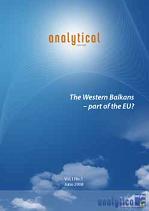Perspectives of the Western Balkans
Perspectives of the Western Balkans
Author(s): Josef C. KarlSubject(s): Politics / Political Sciences
Published by: Аналитика Тинк-тенк Организација
Summary/Abstract: South-East-Europe has faced remarkable historical changes. At the beginning of the year 2007 Romania and Bulgaria became the 26th and 27th member states of the European Union and can now benefit from being part of the world’s largest common market. With approximately 500 million consumers the European Union is one of the leading economic powers and may also play an active and influential role in world politics. Facing the promising perspectives of Romania and Bulgaria, some other nations of the Western Balkans are interested in joining the EU. However, a closer look at the map reveals a culturally, politically and economically most heterogeneous region, which makes generalizations exceedingly difficult. Whereas the most auspicious states of the Western Balkans, Croatia and Macedonia, already achieved official candidate status and paved the way towards full EU membership, countries like Kosovo or Bosnia and Herzegovina still face severe problems and are far from meeting the criteria of Copenhagen. However, in spite of the strong economic and political distinctions, the European Union is determined to involve the whole region in accession negotiations respectively the pre-accession process. Concerning the advanced integration process in the Western Balkans the Enlargement Strategy of the Union states, that “the Stabilization and Association Agreements, linking partners in the region more closely to the EU, with a view to accession, are expected in near completion.” Therefore, the European Union provides focussed pre-accession financial aid to the candidate countries like Croatia and Macedonia and to the potential candidates such as Albania, Bosnia and Herzegovina, Montenegro, Serbia and Kosovo with the total amount of 3,5 billion Euro between 2007 to 2011 in order to implement and support the necessary reforms in line with EU standards. Thus, the Union accommodates the rising importance of the Western Balkans in geopolitics, energy politics and economy. Linking the region to `Western` Europe would be a win-win situation for both sides. Minding this backdrop, this contribution examines the perspectives and problems of the Western Balkans countries.
Journal: Analytical
- Issue Year: 2008
- Issue No: 01
- Page Range: 37-41
- Page Count: 5
- Language: English

